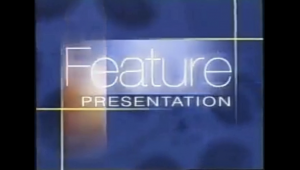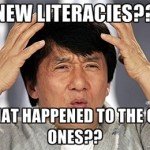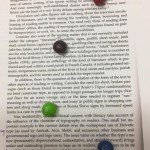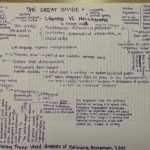Ben Vandersluis: Curated Blog for Week 5
I have never before thought of a graduate seminar as being similar to a TV show, and yet it is the term “two-parter” that best describes our previous two classes in our Theories of Literacy course, cliffhanger and all. And so, as with any good two-parter episode, the second part must begin with an adequate recap of the first.
Previously in Dr. Jaxon’s Theories of Literacy course: Last week we read Deborah Brandt and Katie Clinton’s article “Limits of the Local,” a piece that argues ethnographic approaches to literacy have exaggerated the role of the “local” in literacy practices. There must, the authors argue, be a thingness that connects literacies across locales, a sense in which literacies have a global aspect, not merely a series of local ones. And the nature of that thingness? Well, it is actually things, objects, that act with agency in literacy events and practices—an observation made using Bruno Latour’s actor-network theory. As the authors put it, “[W]ith the help of objects, lots of different kinds of activities can be going on in and across local situations” (Brandt and Clinton 346). Or later on, “[T]hings are not just acted through or upon by readers and writers. They are also actors in themselves … They not only are endowed with local meanings by local agents but endow meaning to the locales in which they appear. They also accomplish connections with other locales” (348). In this way Brandt and Clinton argue for a view of literacy that is locally bound in the social but globally interconnected through materiality.
 As we saw in Cassidy’s summary of last week’s class, this led to an intense class discussion about the agency of objects: Do objects have agency? What does ‘agency’ in this sense mean? If not agency per se, what is the role objects play in social structures? To what extent do objects constitute literacy? Many analogies were made and friendly disagreements arrived at; the whiteboard came into play; innocent bystanding chairs became the chess pieces of our debate. In the end, we never really reached the bottom of the matter. Some of us simply remained unconvinced that objects have their own agency, myself included.
As we saw in Cassidy’s summary of last week’s class, this led to an intense class discussion about the agency of objects: Do objects have agency? What does ‘agency’ in this sense mean? If not agency per se, what is the role objects play in social structures? To what extent do objects constitute literacy? Many analogies were made and friendly disagreements arrived at; the whiteboard came into play; innocent bystanding chairs became the chess pieces of our debate. In the end, we never really reached the bottom of the matter. Some of us simply remained unconvinced that objects have their own agency, myself included.
As a result of our inconclusive debate, we decided to turn to the work of Latour himself for this week’s class. In addition to a further Deborah Brandt article, we would also read a chapter from Latour in which he makes his argument for object agency. This is why I have come to view this week’s class as a sequel to last week’s material: not only are we continuing with the work of Deborah Brandt, we are also returning to our debate of object agency using the work of Latour. And hopefully, this time, the debate will reach its conclusion.
We read two texts in preparation for this week’s class: Deborah Brandt’s article “Sponsors of Literacy,” and Bruno Latour’s chapter “Third Source of Uncertainty: Objects too Have Agency” (from his book Reassembling the Social: An Introduction to Actor-Network-Theory). We read both pieces using the collaborative reading/annotating tool Perusall®. Both of the texts prompted us to consider materiality: the implicit economic exchange present during the acquisition of literacy, and (again) the agency of objects in social contexts and power structures.
Published four years before “Limits of the Local,” we can see Brandt’s “Sponsors of Literacy” as an early attempt to broaden the scope of literacy scholarship beyond the local ethnography, focusing instead on “larger contexts of profit making and competition,” and the “structural conditions in literacy’s bigger picture” (Brandt 166). Literacy, Brandt argues, is not merely an individual development, but an economic one as well. In order to illustrate this dynamic, Brandt uses the term ‘literacy sponsor’ to describe the agents that facilitate or inhibit access to and acquisition of literacy, and who gain advantage by doing so (166). In short, everyone’s literacy acquisition comes through several sponsors during the course of their lives, and since every sponsor benefits from the exchange of literacy, no sponsor is ever truly neutral. As a result of this loss of neutrality, sponsors play a significant role in determining “what, why, and how people write and read,” although the sponsee may be unaware of this bias (168). This inevitably leads to socioeconomic inequalities. Since only certain forms of literacy are highly valued as commodities in our society, “success” (however we define it) becomes largely contingent upon one’s “access to the right kinds of literacy sponsors” (169, my emphasis).
Brandt goes on to use the accounts of specific individuals to demonstrate key traits of literacy sponsorship. These narratives illustrate a) the ways literacy sponsors mediate economic opportunities and access, b) how sponsors determine literacy requirements and thus increase socioeconomic competition, and c) how sponsees appropriate learned literacies and practice them in alternate settings (178, 182-183). Brandt concludes her article by underlining the exchange-based, economic aspect of literacy, suggesting that literacy is not merely an object of pursuit, but that literacy itself also pursues the individual. Brandt’s article thus ends on a note of object agency, which sets the stage for our reading from Latour.
It is important to note here that Latour is neither a linguist nor a scholar of literacy. Rather, his website describes him as a “member of several academies,” but most prominently known as a sociologist. Our reading of his chapter is therefore an exercise in framing our understanding of the “Limits of the Local” article, which uses Latour’s actor-network theory to make its argument for global literacy through object agency. We are also using Latour to think broadly about the thingness of literacy. And so, on to Latour.
Bruno Latour’s chapter “… Objects too Have Agency” is taken from his book Reassembling the Social, in which Latour explores the nuances of actor-network theory. In the chapter we read, Latour’s main argument is that sociologists’ typical understanding of social inequality (and therefore social power) is inherently flawed because it ignores the role of nonhuman elements. Sociologists tend to explain such inequalities by pointing to ‘norms’ or ‘systems’ or ‘culture’ or ‘society,’ a move that relies on the durability and strength of social ties between people or groups of people (Latour 67). But Latour argues that these social ties are not strong at all, but rather weak. He claims that sociologists are neglecting the material conditions that connect people in social structures, and Latour argues that these ‘things’ are what lend strength to society (68). And not only do these ‘things’ provide strength to social structures, but they also—you guessed it—have agency.
To understand the model Latour is proposing, we need to first understand the ways he is (re)defining some familiar terms. ‘Social,’ in Latour’s view, describes a momentary association between entities as they are briefly aligned within a constantly shifting network; this definition of the social thus denies any assumptions that are made based on notions of permanence/stasis (65). Also key is Latour’s use of the terms ‘actor’ and ‘agent’. According to Latour, “any thing that does modify a state of affairs by making a difference is an actor,” and agency is determined by posing the question, “Does it make a difference in the course of some other agent’s action or not?” (71, emphasis original).
For those of us who initially balk at the idea of object agency because we think objects can’t make willful decisions, Latour’s retort is self-evident: that’s not how he views agency. He explains, “[Agency] does not mean that these participants ‘determine’ the action,” but rather ‘determination’ is seen in “metaphysical shades,” not causal binaries (71-72). In essence, this means that a given action is not solely determined by a single human actor, even if it is the human who ultimately throws the proverbial switch. Instead, the determination of an action is guided by numerous nonhuman material factors, all of which play a role in making said action possible or impossible, more likely or less likely. In addition to being at least partial determiners of human action, objects thus have agency in the sense that they “authorize, allow, afford, encourage, permit, suggest, influence, block, render possible, forbid, and so on” (72). This idea of object agency therefore helps broaden our perception of the actors present in a given situation, human or otherwise.
We now turn to our class discussion of these texts. Since Latour’s notion of object agency served as our cliffhanger from last week’s class, it is only natural that we began this week’s discussion by picking up where we left off—this time having read some of Latour’s theory. Dr Jaxon started by observing that Latour’s theory of object agency (and the ways Brandt and Clinton used it in their “Limits of the Local”) solves a problem that we, as graduate students, are not yet experiencing in practice. We are, at present, approaching literacy more in theory than in practice, and so we are not encountering the challenges that led Brandt and Clinton to search for answers from Latour. Once we begin conducting empirical studies, which are riddled with thingness, Latour’s ideas will become more practical. Dr Jaxon used this opportunity to remark that collegiate pedagogical strategies often must strike a balance between learning about a field and learning to do the work of that field.
Dr Jaxon also noted the differences with which several of us reacted to the tone in Latour’s writing. (For an example of Latour’s tone, try these lines from p. 67: “Are sociologists of the social so foolish that they are unable to detect such a tautology in their reasoning? Are they really stuck in the mythical belief of another world behind the real world?” Or this from p. 70: “This does not mean that the sociology of the social is useless, only that it might be excellent for studying baboons but not for studying humans.”) Some of us, like Dr Jaxon and Brady, interpreted Latour’s tone as playful and light, perhaps a way of balancing out the weight of Latour’s topic and lightening the density of his words. Others of us, like Hayden, Brooke, and myself, interpreted Latour’s tone as confrontational and aggressive, perhaps even arrogant. This led us to discuss who gets to write academic prose using this kind of tone, and why? In Latour’s case: is it because he is a white male? Because he is French? Is this a privilege afforded him as an academic revered in his field? These are questions worth considering, regardless of the ways we individually interpreted Latour’s tone.
We then returned to the debate we’d left unresolved from last week: Do objects have agency? How does the role of objects affect us? Dr Jaxon began by repeating a remark from our department chair: “Of course objects matter. You don’t see people asking for a shitty classroom,” which led us to consider the ways an educational space is shaped by objects like chairs, desks, walls, windows, and teaching technologies. We then considered: If an object ‘matters,’ does it have agency? Here Hayden chimed in: “Of course objects matter, but object agency is still different from human agency. … We have to beware of anthropomorphization. We cannot impose our humanness onto things that are not human.”
Here we continued our discussion of object agency by returning to Brandt and Clinton’s “Limits of the Local.” What are we missing by focusing only on the local? What are objects doing in literacy? Tim asked whether objects function at a local or global level. Dr Jaxon responded that she thinks objects participate in a broader global context, returning again to the example of a classroom chair versus a dining room chair: the material shape and situation of those objects determine their use, and we have some global sense of that use even if it’s our first time setting foot in that classroom or that dining room.
Travis pointed us in the direction of Robert Pinksy’s poem “Shirt,” which describes the material existence of a shirt with respect to several factors of its production, ultimately leaving the reader reexamining the causal history of objects. For our purposes, this poem helped us understand the difference between the local (wearing a shirt) and the global (the abuse of factory workers who made the shirt) through the lens of materiality (the shirt itself), which perhaps is a way of understanding Brandt and Clinton’s “Limits of the Local.”
Before taking a break, we shifted to discuss the problematic nature of our academic discipline being called “English,” a term that is vague (‘English’ in what sense?) and often doesn’t describe our work in the field (since we don’t exclusively work with English language). Furthermore, finding an alternative term to describe our field is fraught, since subdisciplines within the field each seem to approach texts in very different ways. Several of my classmates used ideas from our readings to frame their thoughts on the matter. Tim suggested that the English discipline might be a way for us to better understand the local/global aspects of literacy: globally, we refer to a discipline we all generally refer to as “English,” but locally our treatment of subdisciplines may vary. (For instance, an undergraduate “English major” at Chico State may choose between “English Studies,” “English Literature,” and “English Education,” but these subdisciplines may be broken down differently elsewhere, or may go by different names.) Cassidy added that this approach might help us view the CSU system as rhizomatic regarding its variations within the English discipline. From here Brady wondered about comparable disciplines in non-English-dominant countries: do the French have a discipline called “French” that entails the same kind of work we do in English? I also observed that, even domestically, majoring in “English” is nothing like majoring in “French”; the former covering a breadth of literary-, linguistic-, and literature-based practices, while the latter is limited to a study of language fluency lightly salted with studies of culture, history, or literature.
When we reconvened after our break, our attention was entirely devoted to Brandt’s “Sponsors of Literacy.” Since many of the students in the room are also TAs teaching their own sections of FYC, Dr Jaxon asked the class how our roles as literacy sponsors affects the ways our students learn. Brady observed that by teaching certain topics or certain texts in our syllabi, we are necessarily excluding a host of other possibilities. Cassidy echoed the same sentiment regarding style guides: requiring MLA for all students means limiting their access to all other style guides, even though their own disciplines are likely to require something other than MLA. Larisa also observed that the ways we think about and analyze texts are likely to be passed on to our students. I am certain that, as the semester continues to unfold, many of us will be reminded of countless other ways in which our roles as sponsors affect the literacies of our students.
I took the opportunity here to poke at something about sponsorship that had been bothering me. Brandt’s definition of a ‘sponsor’ is conditional upon the sponsor benefiting from the sponsor/sponsee relationship. So I posed the question: is there such a thing as truly altruistic literacy acquisition? What do teachers stand to benefit from sponsorship? Dr Jaxon postulated that teachers might gain a sense of power or self-esteem through sponsorship. Hayden observed that teachers might benefit from contributing to someone else’s rise to success, a fact that Dr Jaxon echoed when she noted that her professional relationships with students (such as serving as chair on a thesis committee) get added to her CV and factor into her ability to receive raises or tenure. Cassidy also observed that the teaching doesn’t just go one way—she gets satisfaction from the fact that she learns from her students as well. Brady succinctly argued that if no languages are neutral, how can any exchange of literacy be altruistic? It seems, therefore, that my question was answered: for better or worse, there is no altruistic form of literacy sponsorship. Every sponsor gains something in the process.
Finally, Dr Jaxon prompted us with questions to connect both readings together, object agency combined with literacy sponsorship. She challenged us: Can a discussion be a sponsor? Or a software (like Perusall)? Or an object? We agreed that this was so, since each of the above can serve as a means to allow or deny access to literacy. But can an object benefit? Well, that’s trickier. Then Brady asked, “Does literacy have agency as an object?” I agreed that it does, since literacy imparts power. Not only in terms of the ability to read and write, but also because the knowledge of words themselves is power. We turned our attention to graffiti as an object of agency, since graffiti is closely connected to the identities of the artist and the audience. In closing out our conversation, the perspective of a visiting guest neatly concluded the topic: as an art major, she shared the observation that no art is ever displayed (or removed) unless there is intent behind the display (or removal) of that art. And if a thing has intent, she argued, then it also has agency. Very nicely said, and a perfect way to conclude our discussion of object agency.
This concludes my summary of this week’s readings and discussions in Dr Jaxon’s Theories of Literacy course. In the process of writing this blog, I’ve found that many of my own thoughts have already worked their way into the piece naturally, but I’d like to share one final thought, as well as some questions I have going forward.
My thought is this. During my reading of Latour’s chapter on object agency, I had a hard time wrapping my head around the idea Latour was trying to convey. I think on some level I was resistant to the idea that material things could have their own agency; it just didn’t fit with my worldview as I understood it. But then I thought of a situation in which object agency made a lot of sense to me, and the whole thing suddenly clicked. I want to share that epiphany here, which I’ve copied from the Perusall comment where I originally typed it:
An apt lens for illustrating object agency might be found in the issue of gun access in the United States. Conservatives tend to defend their access to guns by making claims like, “Guns don’t kill people, people kill people”—which in turn insinuates that “people” have all the agency. The position of most liberals seems to acknowledge that guns themselves contribute to the deaths they cause, that the mere presence of a firearm makes fatalities substantially more likely, even though other nonviolent actions remain available. Hence we have a situation where the presence of firearms seems to contribute to fatal police violence, to mass murder, and to suicide—and this agency is something other than the agency of those who pull the trigger.
Lastly, here are some questions I continue to ask from this week’s materials:
- Given the role of sponsors and the lack of neutrality in literacy exchange, how do we (as educators) equitably determine the contents of our syllabi? We are not, after all, neutral agents in our roles as sponsors.
- We’ve talked a lot about the sponsor/sponsee relationship, but not so much about relationships between sponsors and relationships between sponsees. What are the ways sponsors and sponsees affect each other, and how does this affect our understanding of literacy sponsorship?
 Author Bio: Ben Vandersluis is a graduate student in the English MA program at Chico State, a pursuit he stumbled into during his quest to complete the LEAP program (Literary Editing and Publishing). He is writing his thesis on the shifting boundaries of the horror genre as analyzed through the lens(es) of cultural rhetorics. He loves horror and all things spooky, sinister, macabre, and gothic. When he’s not studying or befriending the monsters under the bed, he prefers to spend time with his wife and newborn son. And there really is a monster under the bed: that would be the cat, Linus.
Author Bio: Ben Vandersluis is a graduate student in the English MA program at Chico State, a pursuit he stumbled into during his quest to complete the LEAP program (Literary Editing and Publishing). He is writing his thesis on the shifting boundaries of the horror genre as analyzed through the lens(es) of cultural rhetorics. He loves horror and all things spooky, sinister, macabre, and gothic. When he’s not studying or befriending the monsters under the bed, he prefers to spend time with his wife and newborn son. And there really is a monster under the bed: that would be the cat, Linus.
Works Cited
Brandt, Deborah. “Sponsors of Literacy.” College Composition and Communication, vol. 49, no. 2, 1998, pp. 165–85.
Brandt, Deborah and Katie Clinton. “Limits of the Local: Expanding Perspectives on Literacy as a Social Practice.” Journal of Literacy Research, vol. 34, no. 3, 2002, pp. 337-356.
Latour, Bruno. “Third Source of Uncertainty: Objects too Have Agency.” Reassembling the Social: An Introduction to Actor-Network-Theory, Oxford University Press, 2005, pp. 63-86.






